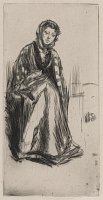The Scotch Widow | ||
| Number: | 147 | |
| Date: | 1875/1876 | |
| Medium: | drypoint | |
| Size: | 205 x 103 mm | |
| Signed: | butterfly at right | |
| Inscribed: | no | |
| Set/Publication: | 'Cancelled Plates', 1879 | |
| No. of States: | 1 | |
| Known impressions: | 18 | |
| Catalogues: | K.142; M.140; W.118 | |
| Impressions taken from this plate (18) | ||
PUBLICATION
It was published in an album of Cancelled Plates ('Cancelled Set') by The Fine Art Society, London, 1879.
EXHIBITIONS
The Scotch Widow was extremely rare and rarely exhibited. An impression was lent by Samuel Putnam Avery (1822-1904) to the Union League Club in New York in 1881 and to the exhibition organised by the Caxton Club in Chicago in 1900 ( ). 7
). 7
After Whistler's death, impressions were shown in the principal Memorial Exhibitions. One impression was lent to the Grolier Club in New York in 1904, and Howard Mansfield (1849-1938) lent his impression to the Whistler Memorial Show in Boston in 1904 whilst another was exhibited in London, 1905 ( ). 8
). 8
 ). 7
). 7 After Whistler's death, impressions were shown in the principal Memorial Exhibitions. One impression was lent to the Grolier Club in New York in 1904, and Howard Mansfield (1849-1938) lent his impression to the Whistler Memorial Show in Boston in 1904 whilst another was exhibited in London, 1905 (
 ). 8
). 8 7: New York 1881 (cat. no. 137); Chicago 1900 (cat. no. 106). See REFERENCES : EXHIBITIONS.
8: New York 1904a (cat. no. 119); Boston 1904 (cat. no. 119), London Mem. 1905 (cat. no. 118).
SALES & COLLECTORS
Samuel Putnam Avery (1822-1904) bought an impression shortly after the drypoint was printed ( ). Charles Augustus Howell (1840?-1890) bought one on 25 October 1877. 9
). Charles Augustus Howell (1840?-1890) bought one on 25 October 1877. 9
 ). Charles Augustus Howell (1840?-1890) bought one on 25 October 1877. 9
). Charles Augustus Howell (1840?-1890) bought one on 25 October 1877. 9 9: 6-25 November 1877, GUW #02178.
Surviving impressions from the cancelled plate are often in the album as published in 1879. For instance, the British Museum bought an album in 1887 ( ), and Charles Lang Freer (1856-1919) bought a set from Knoedler & Co. in 1893 (
), and Charles Lang Freer (1856-1919) bought a set from Knoedler & Co. in 1893 ( ). Thomas Glen Arthur (1858-1907) also acquired a set in 1887 (
). Thomas Glen Arthur (1858-1907) also acquired a set in 1887 ( ) which later went to Boston Museum of Fine Arts. Early owners included George Aloysius Lucas (1824-1909), whose impression went eventually to Baltimore Museum of Art (
) which later went to Boston Museum of Fine Arts. Early owners included George Aloysius Lucas (1824-1909), whose impression went eventually to Baltimore Museum of Art ( ). Boston Public Library also acquired a set (
). Boston Public Library also acquired a set ( ). In addition, a set acquired by J. Littauer, Munich was sold to the Hamburger Kunsthalle in 1896 (
). In addition, a set acquired by J. Littauer, Munich was sold to the Hamburger Kunsthalle in 1896 ( ).
).
 ), and Charles Lang Freer (1856-1919) bought a set from Knoedler & Co. in 1893 (
), and Charles Lang Freer (1856-1919) bought a set from Knoedler & Co. in 1893 ( ). Thomas Glen Arthur (1858-1907) also acquired a set in 1887 (
). Thomas Glen Arthur (1858-1907) also acquired a set in 1887 ( ) which later went to Boston Museum of Fine Arts. Early owners included George Aloysius Lucas (1824-1909), whose impression went eventually to Baltimore Museum of Art (
) which later went to Boston Museum of Fine Arts. Early owners included George Aloysius Lucas (1824-1909), whose impression went eventually to Baltimore Museum of Art ( ). Boston Public Library also acquired a set (
). Boston Public Library also acquired a set ( ). In addition, a set acquired by J. Littauer, Munich was sold to the Hamburger Kunsthalle in 1896 (
). In addition, a set acquired by J. Littauer, Munich was sold to the Hamburger Kunsthalle in 1896 ( ).
).Prices were low but collectors and collections were keen to have the set of cancelled etchings, as a record of a substantial number of otherwise unrecorded etchings and drypoints. A set, probably acquired from the Fine Art Society by Alphonse Wyatt Thibaudeau (ca 1840- d.1892), was auctioned in 1889 and bought by Robert Dunthorne (b. ca 1851) for £0.6.0. 10 Dunthorne exchanged it for other works with Rosalind Birnie Philip (1873-1958) who bequeathed it to the University of Glasgow (see  ).
).
 ).
). 10: Sotheby's, London, 13 December 1889 (lot 787 or 789).
